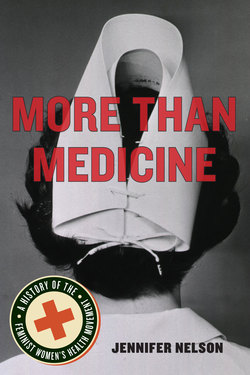Читать книгу More Than Medicine - Jennifer Nelson - Страница 10
На сайте Литреса книга снята с продажи.
2 “Thank You for Your Help . . . Six Children Are Enough” The Abortion Birth Control Referral Service
ОглавлениеCommunity and neighborhood health clinics, grounded in the civil rights and New Left movements, provided intellectual, political, and practical experiential precedents for the women’s health movement. By the early 1970s, with the explosion of Women’s Liberation participation in cities around the country, feminists began to create new health institutions for themselves and other women. The feminists who built these institutions perpetuated the earlier health reform commitment to reaching people without access to health care. At the same time, they also wanted to expand women’s sexual and reproductive autonomy and dismantle sexual and reproductive double standards that seemed natural and normal to many but actually stemmed from deeply entrenched, yet socially constructed, gender roles. As women met and discussed which social mechanisms perpetuated sexist gender roles, they came to the conclusion that gender inequalities could not be transformed unless sexual and reproductive autonomy were also secured.
With Women’s Liberation, women’s increasing expectation that they be able to freely explore sexual feelings and desires became linked to the need to dramatically improve abortion and birth control access. Women’s Liberation groups across the country were demanding free, legal, and easily accessible termination procedures performed in safe and nonjudgmental environments. Yet, even as abortion became legal in a handful of states, including Hawaii, Alaska, California, New York, Washington State, and Washington D.C., many women still found it difficult to locate providers of safe abortions in supportive environments. As Carole Joffe has shown, abortion was still not commonly available in U.S. hospitals or other medical institutions even after Roe v. Wade made abortion legal in 1973. For this reason, feminists created abortion referral services to help women secure abortions both before and after Roe.1 This chapter traces the history of one feminist abortion referral service, the Abortion and Birth Control Referral Service (ABCRS), founded by feminists who were members of the University of Washington YWCA (U of W YWCA) in Seattle. It also examines some of the varied attitudes towards abortion in the 1970s expressed by women who used the service and reported their feelings after their abortions on feedback forms collected by the ABCRS.
Washington State, after a two-year campaign led by Washington Citizens for Abortion Reform, became one of the first states to legalize abortion before Roe, and the first to legalize abortion through popular referendum. On November 3, 1970, 56 percent of those who voted agreed that abortion should be legal up to sixteen weeks’ gestation. Leading up to the vote, there had been broad political support for the referendum from the Republican governor of the state, Dan Evans, Republican state senator Joel Pritchard, who helped draft the referendum, and other lawmakers. The law required that abortion be performed by a doctor in a licensed medical facility, that the patient reside in the state for ninety days, and that minor patients notify their parents and married women notify their husbands of the abortion.2
Yet, the new law didn’t provide any mechanism to help women access abortion, just as it did not require doctors or hospitals to provide abortions. Feminists associated with the U of W YWCA realized that women still needed help figuring out where to acquire a safe, legal, and compassionate abortion. Jan Krause, then program director of the U of W YWCA, recalled working with Planned Parenthood director Lee Minto to compile a list of medical doctors from the Planned Parenthood Medical Advisory Committee who would be available to an abortion referral service housed and funded by the YWCA.3 Since hospitals were not quick to establish abortion services after legalization, it fell to individual doctors to provide them after the law changed. Many individual doctors were also reluctant to provide abortions after legalization, often because of religious reasons but also because those who performed abortions were still stigmatized as “quacks” or as greedy, a legacy of the pre-Roe era. Those who did provide abortions often did so only for their private patients, making abortion less accessible to poor and young women who did not have an established relationship with a physician. Freestanding clinics eventually became the most common abortion providers and helped make abortion both affordable and easily accessible.4
According to Patricia Valdez, a volunteer coordinator for the ABCRS referral service, the purpose of the service “was to try to give women a good, safe, and reassuring referral to a good, safe, and reassuring practitioner who would be sensitive to their needs and all the negative projections about abortion at the time.”5 Some of these women would also be traveling to Seattle from out of state because abortion was not yet legal in their places of residence or because it was expensive and difficult to access. The ABCRS volunteers acknowledged the residency requirement by informing out-of-state women of it, but still referred them to physicians in Seattle willing to perform their abortions.6 Thus, due to the referral work of services like ABCRS, legal abortion gradually became more accessible even before the Supreme Court’s decision in Roe v. Wade made abortion legal in every state in 1973.7
Seattle feminists decided to continue to organize for women’s sexual and reproductive health and autonomy after Washington State legalized abortion because they contended that the new abortion law was only a first step towards full gender equality that would allow women to make unencumbered choices about their sexuality and sexual and reproductive health. They decided that an abortion and birth control referral service would best meet their immediate goal of helping women access pregnancy testing, legal abortion, and contraception, while larger educational and activist strategies also associated with the YWCA were designed to educate women about their bodies, transform their relationships with medical providers, and interrogate socialized gender roles that perpetuated sexual and reproductive double standards.8
